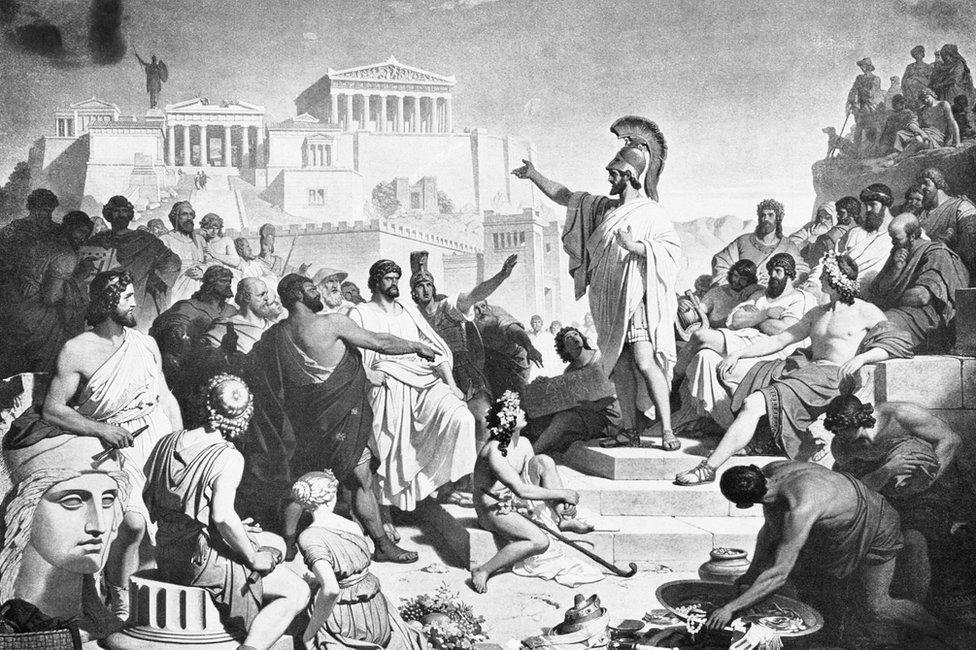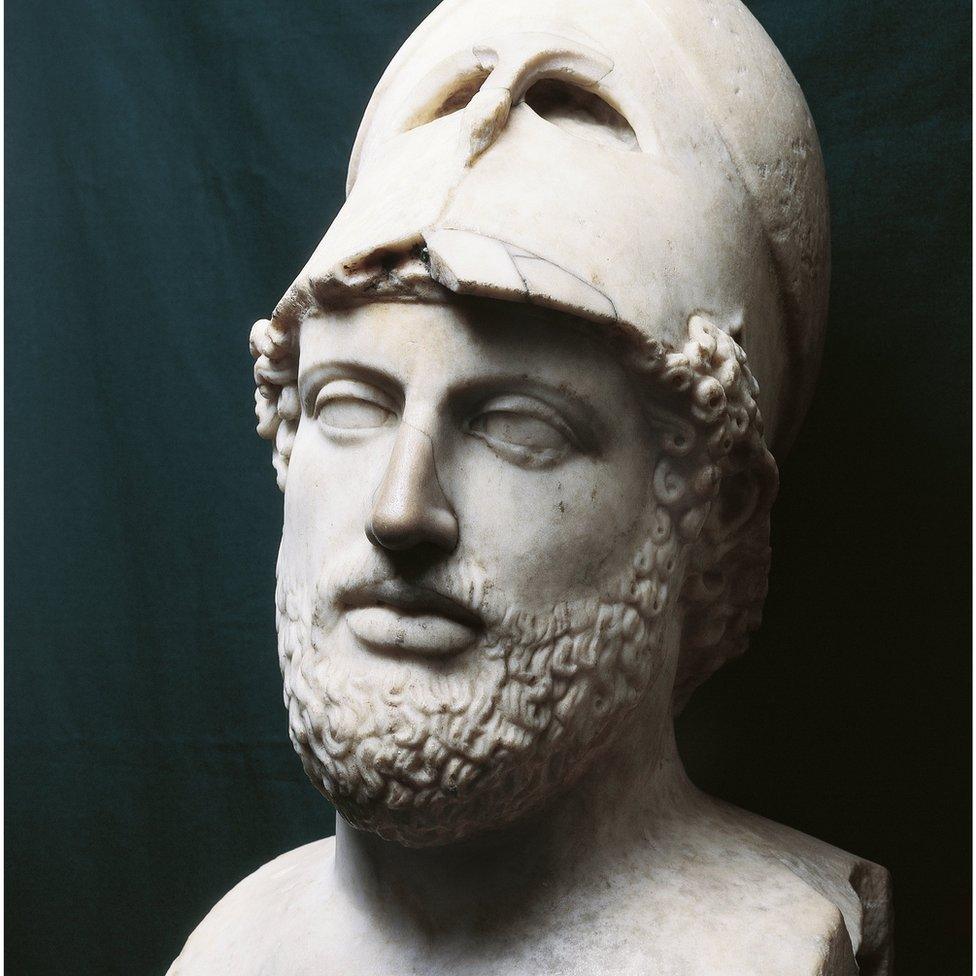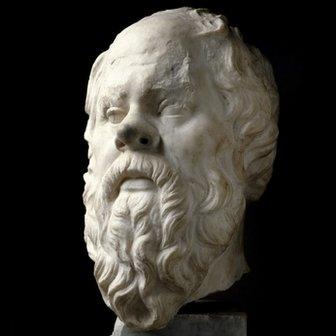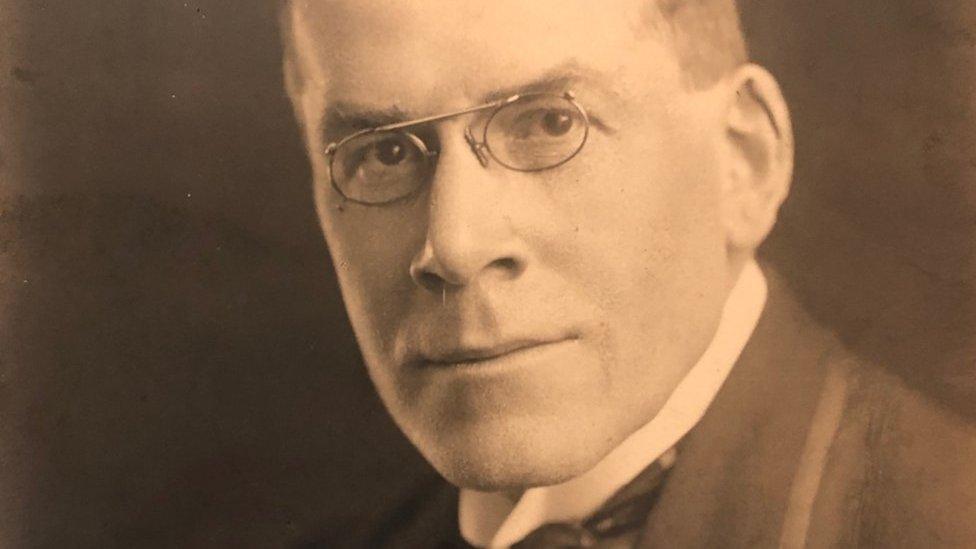Coronavirus: What Boris Johnson's Greek hero teaches us about epidemics
- Published

Boris Johnson at the Parthenon in May 2012, shortly before the London Olympics

As Boris Johnson recovers from Covid-19, he will undoubtedly be thinking of an earlier epidemic, says Oxford classicist Armand D'Angour - the plague that hit Athens in 430 BC, and killed the prime minister's hero, Pericles. It's an episode, D'Angour argues, that holds many lessons for today.
Britain's Prime Minister, Boris Johnson, is well versed in the history and culture of ancient Greece. He knows that Western literature begins with a plague, the epidemic described in the opening book of Homer's Iliad - of which Boris can happily declaim scores of verses from memory. And his political hero has long been the ancient Athenian leader, Pericles, whose bust sits in his office in 10 Downing Street.
The prime minister has often quoted admiringly the stirring oration given by Pericles to honour the dead after the first year of a destructive war against Sparta. And he will be well aware that Pericles gave a second famous speech a year later, after a devastating plague, probably a form of typhus, had killed around one third of Athens' citizens.

Pericles, giving one of his orations
Both orations were reported by the contemporary historian Thucydides, whose searing description of the Great Plague is worth reading for its literary virtuosity alone. Commentators today have drawn parallels between the responses of Athenians - ranging from the heroic to the contemptible - and those of valiant NHS staff and scared panic-buyers today.
But surprisingly, none has drawn attention to the lesson Thucydides himself intended. What doesn't change, wrote the historian, is human nature; you can expect people to react in similar ways when they encounter events like those that have occurred in the past. He embarked on his work, he says, because a clear grasp of the events he was living through could guide responses to similar events in future.

A bust of Pericles
He modelled his method on that of the most innovative medical practitioner of the day, the physician Hippocrates. Rather than prescribing prayers and religious rituals, spells and incantations, or exotic herbs and quack remedies, Hippocrates and his contemporaries were visiting sick patients, meticulously noting their symptoms, and keeping track of how they responded to prescribed treatments such as sleep, exercise, and the regulation of diet. Boris Johnson was a patient at St Thomas' hospital, and is likely to have been participating in a medical trial that compares treatments for Covid-19 - so it may be that Hippocrates will come to his mind, as well as Pericles and Thucydides.
"One of the worst aspects of the plague was the despair into which people fell on finding they had the disease. Those who were convinced they had no hope were much quicker to give up and die," observed Thucydides. "Another was the rate of infection among those who flocked to care for and doctor to others: they died in droves, and had the highest incidence of mortality… In addition, the plague led to greater crime, since criminals calculated on escaping detection and penalties."

Boris Johnson making a speech in Latin in 2007, as part of a campaign to ensure the continued teaching of classics in schools
What might we learn from these observations? First, that people should avoid becoming infected by close contact, and that medical staff and carers should be protected. Secondly, that the law must continue to function robustly. And thirdly, that it is important for people to preserve a positive state of mind. Measures to achieve these aims have been, if in some cases belatedly, widely pursued in the UK and elsewhere.
The Athenians survived the plague of 430 BC with astonishing resilience. Just 15 years later they were able to muster a huge military and naval force to mount an offensive expedition overseas. But when the plague struck, Athens had only recently gone to war, and a large contingent of troops had been sent north to pursue hostilities. Sadly, they took the disease with them, and over 1,000 men died from it.

Socrates did not conform to the Athenian ideal of beauty
One of the soldiers serving on the campaign was the philosopher, Socrates. Not only did he survive infection, allegedly thanks to his physical toughness and discipline, but on return to his plague-ridden city he was said to have tended unscathed to the sick and dying. Socrates had evidently acquired immunity from his earlier exposure to the disease, just as Thucydides himself, who had survived infection, recognised that this made him immune from reinfection.
It was to be thousands of years before medical immunity was properly understood, but the historian implies that historical hindsight can itself be a kind of vaccine. History need not simply recall the horrors of the past. It can guide us towards adopting precautions, remind us that accurate observation is vital to ensure a better response in future, and reassure us that normal life will one day return.
Meanwhile, we should also remember that history never repeats itself exactly, even if it can offer valuable lessons for posterity.

The Parthenon was built during the Age of Pericles
Pericles had been the leading citizen in Athens for over three decades before his death from the plague at the age of 66. Until that day his luck had held to a remarkable degree. He had been admired and bitterly reviled, had fought military campaigns and faced legal trials, and had survived accusations of corruption and sexual misconduct. In his 50s he entered into a passionate and enduring relationship with the brilliant young Aspasia of Miletus, who bore him a child and helped him compose his magnificent funeral oration to the war dead.
Britain's prime minister is 55. He has faced stern challenges, has experienced failure as well and success, and has benefited greatly from luck, no less than political skill. When, as is hoped, he makes a full recovery from Covid-19, perhaps busts of the historian Thucydides, the physician Hippocrates, and the philosopher Socrates, should join that of Pericles on his mantelpiece in No.10 Downing Street.
Prof Armand D'Angour, the author of Socrates in Love: The making of a philosopher, wrote the Greek ode that Boris Johnson recited at the opening gala of the London Olympics in 2012
You may also be interested in:

In these dark days of Covid-19 some practices have remained timeless - the use of soap, scrubbing and fresh air. Other advice on infectious diseases given my grandfather Dr John Davy Rolleston in 1940 sounds, well, from a bygone era.
Does my grandfather's 1940 infectious disease advice still hold true?